
By Brendon Harre*
This paper is an expansion of my thoughts first articulated before the 2023 election in a paper titled — “Can NZ Governments Deliver on their Promises?”.
Part One — A review of Labour’s 2017 to 2023 performance
The Labour led government in 2017 had a mandate to reform the built environment. To change the Resource Management Act (RMA), and how transport, housing, and infrastructure systems are delivered. They had this mandate because the housing crisis was one of the publics top concerns going into the 2017 election.
Arguably so did the earlier National led government because John Key campaigned on housing affordability before the 2008 election.
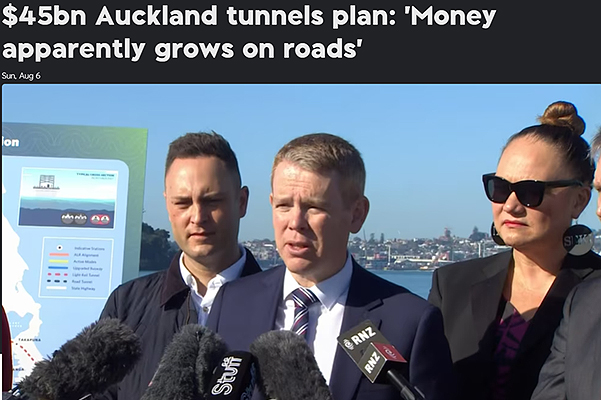
Source — 1 News. In 2023 Labour announced it would extend light rail 21 km north to Albany, despite not having started building light rail to the airport.
But Labour did not deliver on its promises. Kiwibuild did not even achieve 5% of its 100,000 houses target, and Labour’s promise to build Auckland light rail evolved from an achievable surface level project from the city to the airport to a longer and more expensive underground line that did not even get one metre of track built.
Much of what was delivered there was a backlash against, such as, the three-water reforms, and the medium density residential standard amendment to the RMA.
Added to the backlashes and the undelivered promises there were compounding events like the Reserve Bank inflating the housing market in response to Covid.
All of this meant the public lost faith in Labour’s ability to deliver solutions for the issues they care about. There has been a clear observation that as the state’s ability to deliver has shrunk, so has the people’s willingness to vote.
The issue isn’t so much apathy or cynicism or even sheer ignorance. The issue is the state’s capacity to deliver.
Not delivering on campaign promises is likely to be the underlying cause of Labour’s declining public support and its 2023 election defeat. Governments get voted out rather than oppositions get voted in. Something the new National party led government will need to be mindful about because they campaigned hard on ‘cost-of-living’.
It is important that Labour reviews its overall strategy for the time it was in government from 2017 to 2023. As others have said it is time to be brutally honest about why Labour lost.
When Labour decided on how to tackle the housing crisis, choosing between a top-down versus bottom-up approach was a key strategic decision. They tried a top-down governance strategy to fulfil its “Let’s Do This” promise. It is not clear the decision makers at the time, or even now after the fact, are aware of the implications of their choice. But this choice determined the policy direction for how they managed their most important 2017 election promises.
Taking a top-down approach was not unprecedented — this strategy worked well in Japan to produce affordable housing. In the transport policy space Japan also had unique top-down solutions ensuring that city transport infrastructure was not subsidised which helps keep its cities affordable.
Yet the top-down governance structures New Zealand tried to implement were not as successful or as stable as Japan’s and are quite different to the bottom-up approach that many European countries have successfully used to provide affordable living costs (fully described in Part Two).
Because of the prolonged periods to gear up to build houses and construct infrastructure (longer than a typical New Zealand government lasts), a top-down approach to housing policy, the built environment, and infrastructure provision requires cross-party collaboration. This was initially achieved for planning reform with the Resource Management Act National Policy Statement on Urban Development (NPS-UD) and Medium Density Residential Standards (MDRS).
But cross-party collaboration was never achieved for the three-water infrastructure reform nor for rapid transit projects in Auckland (the light rail project) and in Wellington (Let’s Get Wellington Moving). Six months prior to the election Luxon withdrew National’s support for the MDRS. After the election, the National led government cancelled the new RMA legislation that Labour had passed in 2023 — the Spatial Planning Act and the Natural and Built Environment Act. This means New Zealand has returned to an older version of the RMA that both sides of the political spectrum have for many years said is flawed and needs to be replaced.
Important right wing campaign organisations, such as New Zealand Taxpayers Union campaigned to stop three-water reform and stop central planning committees (which is how they characterised Labour’s RMA reforms).
Top-down governance structures designed to improve public services are part of the Labour party’s DNA. The party’s most reforming period in government — the first Labour government of 1935 to 1949 successfully centralised power to create the modern social welfare system, the modern health system, and it raised the school age which massively expanded the education system with the modern high school structure, and so on.
Whereas improving local public services by creating bottom-up governance structures is uncharted territory for the Labour party. Creating these sort of governance arrangements has important implications for how sovereignty is viewed, the relationship between the Crown and Māori, and so forth. It is complicated and Labour stuck with what it knew.
Labour by choosing the top-down approach put its faith in centralising power to the professional management class (PMC) in Wellington. Whose implementation strategy was the standard game-plan that the professional management class always advocate for.
the centralisation of the state bureaucracy and the creation of high-income jobs for educated knowledge workers: lawyers, consultants, ICT, corporate communications and PR; endless layers of management.
The strategy did not work. Sure, visions were expressed. Systems changed. In the abstract world where the PMC exists there was a flurry of activity. Yet in the real world nothing changed. Real problems were not fixed.
For example, the road toll did not fall — the road-to-zero vision failed. Houses are still too expensive. Infrastructure is too expensive, and what infrastructure we do have is often of a third world standard.
What New Zealand’s infrastructure is like, can be described in crude terms by the following examples. Repeatedly there has been shit flowing down the streets of New Zealand’s capital city, and you have to boil water in New Zealand’s premier tourist town to not get the shits!
The reality is that local government and the public services they deliver are broken, and the centralised state in Wellington showed itself as incapable of riding to the rescue. This has profound consequences, if local government performance cannot be improved, and if it cannot be replaced, then ‘Let's Do This’ type promises, such as, building 100,000 houses, constructing light rail, reducing the cost-of-living, and so on, cannot be delivered.
I think this means if a future New Zealand government genuinely wants to tackle the housing crisis, they will need to grow a growth coalition (fully described in Part Two). They will need to empower the local not the centre.
Labour needs a complete strategic rethink on how it delivers important campaign promises because in the end tactical Hipkins offering distractions like GST off fruit and vegetables was soundly beaten by strategic Luxon campaigning on the much broader issue of cost-of-living.
In summary for the Labour governments of 2017 to 2023, “Let’s Do This” failed, and “In It For You” was an insufficient replacement.
Part Two — What does a growth coalition mean?
An interesting US meta-study titled Growing the growth coalition looked at incentives on local government as the explanation for why they have implemented increasingly restrictive zoning requirements in recent decades.
There is plenty of evidence showing that when local and regional government are given better infrastructure funding tools, they form an alliance of all the relevant public and private systems to implement more pro house-building policies to quickly grow the housing stock — for instance, they voluntarily relax zoning requirements without being steam rolled into it.
The underlying idea of the growing the growth coalition concept is a social contract whereby the residents of a city and a region agree to allowing more houses to be built and having more people move into the area in exchange for better infrastructure or some other collective improvement. For example, better transport connectivity.
I would be deeply suspicious of a continuation of the top-down steam roller strategy with the likes of capacity assessments. For instance, National’s 30 years of zoned housing supply capacity will be subverted without wholesale reform to how local government funds infrastructure. The subversion process has already started.
The financial constraints on local government in New Zealand are such that they are forced to go on an infrastructure strike. Without infrastructure, new housing stock will be insufficiently supplied, and the housing crisis will worsen. This is especially significant when New Zealand’s immigration rate is such that the population of Dunedin is added to the country every year.
It should be obvious that if the various parts of New Zealand are getting a Dunedin level of population increase then they should have the revenue resources to build at least the amount of infrastructure that Dunedin has. The problem is central government does not share the revenue it gains from a growing population with the growing parts of New Zealand — the commonsense solution doesn’t seem to be agreeable to head office politicians.
It is possible that the National led coalition government will commit to forming growth coalitions with local and regional government as a strategy for achieving its cost-of-living promises. But it seems unlikely. This concept was not part of the government’s coalition agreements.
Talk of city and regional deals is just that. There are no agreed upon ‘city-deal’ policies in the coalition agreements with ACT or New Zealand First and there were no new local governance fiscal tools created for cities and regions to provide their own growth coalition, except for ACTs policy of central government sharing construction related GST with local government. National has only agreed to ‘consider it’.
Yet the new government’s taxation and spending promises are so tight there is no fiscal headroom to give any funding support to the growth coalition concept even if it wanted to. National will therefore politely reject ACTs sharing of GST with local government policy proposal because it has promised to prioritise tax cuts and repayment of debt instead.
Journalist Simon Wilson has written that the government implementing local government revenue reform so that deep-rooted infrastructure problems can be tackled is the single most important challenge for government relations with Auckland. Yet his calculations showed the chances of genuine infrastructure funding reform being implemented is remote because of the cost implications on central government finances.
This is unfortunate because a properly funded growth coalition would be the opposite of the vetocracy that currently reigns in the housing, RMA, transport, and infrastructure provision space.
The political scientist Francis Fukuyama believes the public gets despondent with the lack of progress that vetocracy causes which then leads to populism and authoritarianism. It would be my bet that the coalition partners will lean into populism and authoritarianism rather than doing the hard work to reform away the vetocracy. As Dame Anne Salmond states any society can be split apart.
My impression from National’s housing and infrastructure spokesperson — Chris Bishop — is that he would favour solutions whereby infrastructure pays for itself. This could be consistent with the growing the growth coalition approach. Yet it is doubtful that he has the genuine support from his party in this view. National may say the party position is that ‘infrastructure should pay for itself’, but the party’s actions in government show they don’t really believe in the concept.
The new coalition government is committed to using the consolidated fund — general tax revenue — to fund its transport promises, the next iteration of the Roads of National Significance. New transport infrastructure will not pay for itself — the general taxpayer will subsidise it.
And one of the Coalition government’s first actions was to dismantle Labour’s three water reforms and return the problem back to local government without detailing how local government will fund improvements in their water infrastructure — which remember are in a terrible state of repair. So, the inclination of local government to cooperate with any future growth coalition is likely to be worse not better.
Funding infrastructure is about ensuring existing infrastructure systems can firstly be adequately maintained and secondly be expanded in response to the various demands on the built environment (such as, population growth, economic change, and climate change adaptation). To understand the implications of expansion, an understanding of exponential mathematics is important. For instance, a population growth rate of 0.5% means a population doubling period of 140 years. While a growth rate of 1.5% has a doubling period of 47 years and a 2% rate has a doubling period of only 35 years.
Both Labour and National suffer from magical thinking according to business journalist Bernard Hickey the editor of The Kaka — they believe there is no problem with New Zealand’s population increasing by 1.5 to 2.0% per year for the last 20 years whilst infrastructure planning and funding is deep frozen at a rate of 0.5% growth. A level that obviously under predicts and under provides for New Zealand’s actual growth needs by ever increasing amounts. This means the country has inadequate infrastructure funding and a growing infrastructure deficit. Thus, explaining the often reported on poor water services, poor transport infrastructure, poor housing, and so on.
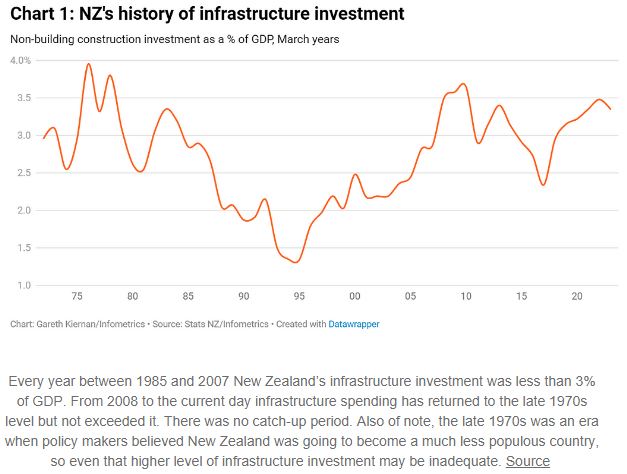
The infrastructure commission has a great little video looking at how New Zealanders pay for transport, electricity, water, and telecommunications services. This is part of an ongoing area of work for the commission. So, there is some investigation at the institutional level on different ways that infrastructure can be funded. But without a complete strategic overhaul the work will be too little, too late.
For transport and local infrastructure projects, I believe there are four hypothecated funding solutions.
1. Motor vehicle pays — what we currently use to fund the National Land Transport Fund (NLTF). And this system could be updated with better congestion charging, car parking fees, and road tolling.
In theory the NLTF funds the construction and maintenance of all roads designated as state highways and 50% of local road costs. The rest of the funding for the road network comes from local government ratepayers.
In practice new transport projects in New Zealand are not funded by hypothecated funding sources, such as the NLTF and local councils, because they have insufficient funds.
Instead, the 2008 to 2017 National led governments have used additional funding from the consolidated fund to pay $9.6 bn for the “Roads of National Significance” — which was a large subsidy to construct roads chosen for political reasons.
The last Labour led governments did something similar for a $12 bn scheme which they titled the “Infrastructure Upgrade Programme” (NZUP). The Auditor-General was critical of the decision-making processes around the former government's infrastructure programmes.
“The process to identify projects and announce funding for NZUP projects took only a few months. Setting up the application process for the SRP took only weeks,” he said. It concerns me that significant decisions on the spending of public money continue to occur without appropriate processes for ensuring value for money and transparency. I think that Parliament and the public have a right to expect more for spending of this scale.”
The new National led Coalition government will continue the practice of using general tax revenue to fund the next generation of Roads of National Significance. It is notable that the poor processes that the Auditor- General criticised the previous government for using have not been changed by this current government.
2. Building construction pays. For example, central government shares construction related GST revenue with local government (ACT’s policy).
3. Land pays — better land value capture tools, such as targeted rates, or land readjustment as used in Japan.
Interestingly, some institutions have a hybrid of revenue sources. Such as, London’s City Bridge Foundation having both tolls and local land endowments which has fully funded all bridge construction and maintenance in London for the last 800 years. Currently it has enough funds in its endowment that it could replace any one of its Thames crossing bridges without requiring any external aid!
Land value capture techniques can be hard to explain and difficult to implement — it can be successful like the London and Japanese examples show. Yet in many cases they require extensive negotiation with existing landowners, and they can be difficult to apply in some situations — such as building new infrastructure through suburban areas. The earlier Labour government tried to use targeted rates to fund built environment infrastructure, but it generated little revenue, so this infrastructure funding tool did not make a significant difference to infrastructure supply.
4. Agglomerated clusters of people pay — in France for instance, there is regional transport taxes in bigger towns and cities. Roughly 1 cent in the euro of PAYE tax goes to regional transport providing entities, which are appointed by local or regional government. It is called Versement transport (VT).
Essentially this means the agglomeration gains from transport infrastructure that allows a greater number of people to be better connected raises incomes above what they would have been (and reduces living costs). A small, hypothecated tax on these better-connected people pays off the infrastructure that provides the improved transport connections.
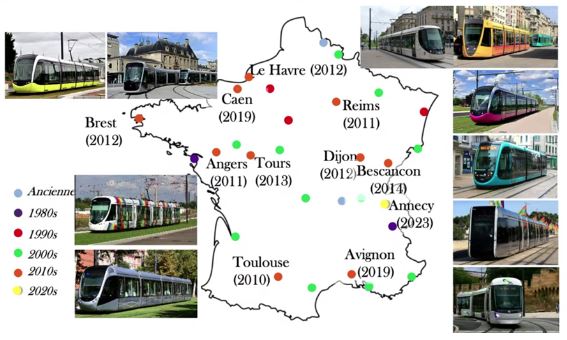
See this link for the segment of the video that discusses how France used VT taxes to roll out light rail across an increasing number of large, medium, and small French cities. Pay particular attention to how in French cities workers are better connected to places of employment compared to similar sized cities in the neighbouring UK which does not have the VT infrastructure funding tool.
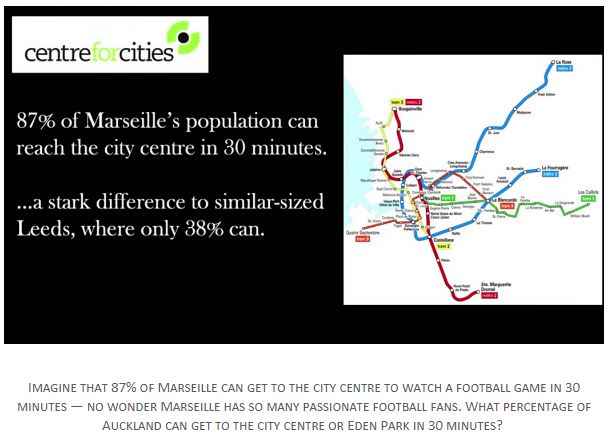
Urban economic research shows the more workplaces a worker can access in a given travel time is associated with higher levels of pay and productivity. This means agglomeration can pay for better infrastructure in a hypothecated manner. In the French example the higher local income that better connectivity provides will be boosting workers' pay by more than the VT tax they incur, meaning local workers are better off than the alternative situation of not paying the local transport tax and not improving local transport connectivity.
It is noteworthy that over time there was demand for smaller French towns and cities to get this infrastructure funding tax and that even right-wing Mayors have campaigned on improving public transport for their city because of the economic benefits it brings. Also of note, better transport connectivity not only improves income it would lower living costs as it gives workers and local residents lower transport costs and more housing choices.
It is not surprising that French Majors, even its right-wing Majors are investing in public transport because something that urban theorists have found to be true — the Downs–Thomson paradox — states that the equilibrium speed of car traffic on a city road network is determined by the average door-to-door speed of equivalent journeys taken by public transport or the next best alternative.
In other words — it is often best practice to improve a road network by investing in alternative transport networks rather than investing in more roads because this frees up road movement. This is especially true for gridlocked towns and cities. The problem with building more roads is it induces demand for more road network usage, whilst potentially undermining the use of alternative networks, which combined can cause road congestion and slower travel speeds.
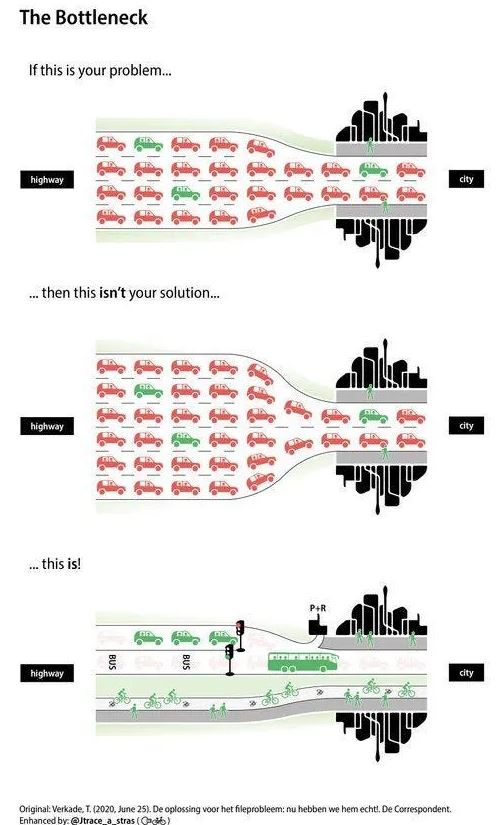
The reason alternative transport networks are often preferable is they allow more people to connect to more places while taking up less space on public right of ways i.e. improving travel connectivity is a solvable spatial mathematics problem.
New Zealand has one hypothecated transport funding tool — charging motorists fuel taxes and road user fees that the NLTF collects to fund Waka Kotahi the New Zealand Transport Agency (NZTA). The NZTA’s funding mechanism and its long history of being a state highway building agency has given it a culture and expertise that primarily focuses on expanding the road network for motor vehicles. When redirected to other tasks by government policy statements, such as, road safety or building alternative transport networks it has struggled. For instance, it was unable to consistently lower the road toll despite being given $2.9 bln between 2021 and 2024 for the road to zero campaign.
New Zealand has no hypothecated funding tools for investing in alternative travel mode infrastructure, which is almost certainly poorly affecting travel connectivity. This is a flaw in the country’s institutional make-up, especially because the fix-it fudge is central government making politicised road building announcements.
New Zealand’s ad hoc infrastructure provision strategy is likely to be an underlying cause for the difficulties it has in delivering efficient low-cost project management for transport construction schemes.
Another point worth making in addition to growing the growth coalition strategy is when examining what a new strategy for the built environment could look like, New Zealand should look to examples from outside the English-speaking world. Because the English-speaking world has for decades under built housing and has the most expensive infrastructure costs.
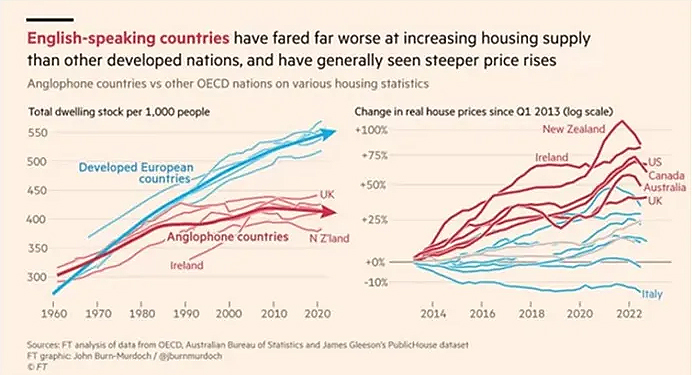
Source — The Anglosphere needs to learn to love apartment living. Housebuilding rates in English-speaking states have fallen behind the rest of the developed world
Not only is the non-English speaking developed world better at building houses it has the significant advantage of creating more stable growth coalitions with better pipelines of infrastructure projects that have lower delivery costs. For example, France’s transit infrastructure building costs per km are one quarter of New Zealand’s costs.
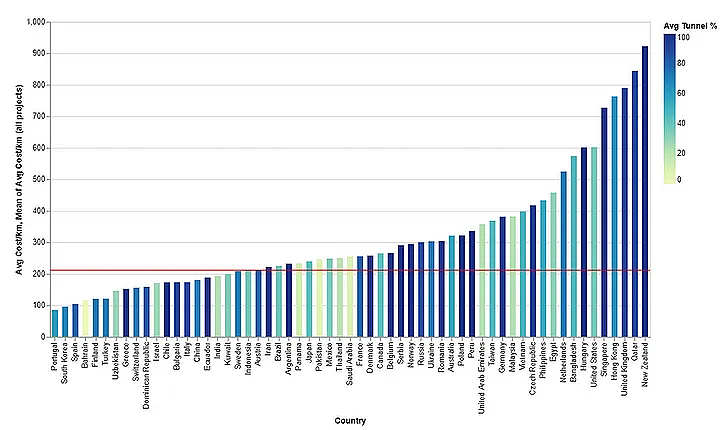
Source — Transit Cost Projects. Note NZ is at the far right most expensive part of this graph.
Imagine how much transit infrastructure New Zealand could build if it had France’s cost structure and imagine how much housing supply this would unlock!
Part three: Poor infrastructure and poor housing policies are causing basic societal expectations to break down
As discussed in the above first two parts, at the city and regional level the social contract — that being open to house building and people moving into the area will be rewarded with infrastructure improvements — is well and truly broken. Many decades of non-delivery of infrastructure mean very few New Zealanders are optimistic that the infrastructure conditions they experience in their day-to-day lives will get better. And they certainly do not believe that population growth will lead to better infrastructure – they probably believe it will make the situation worse.
This has important implications. New Zealand’s high inward migration rate is matched by a high outward migration rate, as the young and talented desperately search for better conditions elsewhere.
For many young New Zealanders, like their peers in other Anglo countries, the aspiration to have an independent life is a real struggle.
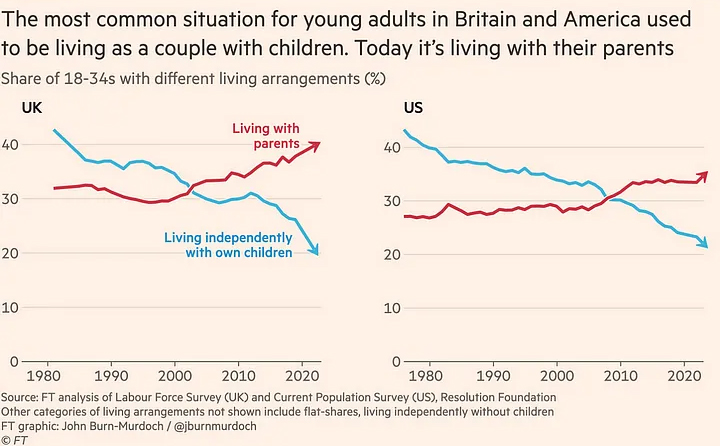
For the current generation of young adults, it is taking longer to save to buy a home. In places like London, without parental help the aspiration is simply impossible. Spending 30 years to save for a deposit on a London house is not a doable plan.
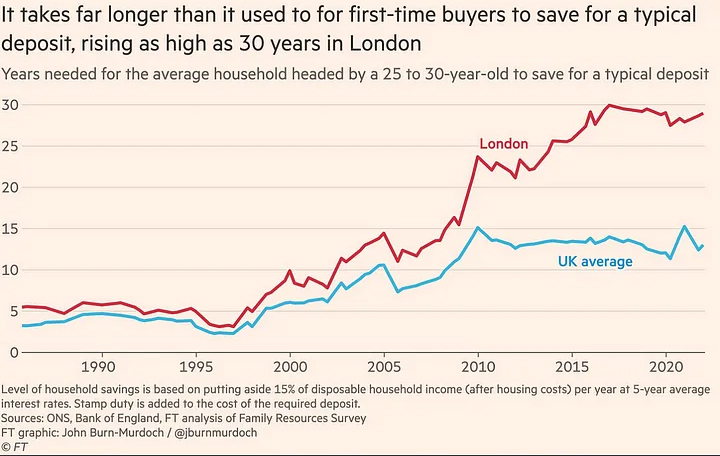
New Zealand’s most expensive cities, such as Auckland, have a similar problem. Meaning another basic societal expectation is failing — that if you study hard, get a good job, save your income, then you can own a home and live a decent life. Unfortunately for many this expectation is no longer valid — the costs have become too high, and the rewards are too little.

The media reported in November 2020 that a landlord was charging $170 a week for a converted sunroom (note the brick walls), in a flat with seven other people in Wellington. In Austria the average rent for a whole social house is $177 per week.
For New Zealand’s low-income households, who are dealing with the rental market rather than the first home buyers' market, the unaffordable housing situation is even worse – they certainly cannot hope to save for home ownership, and despite working hard it is doubtful they are living a decent life, given the state of the rental market.
Statistics show for the bottom 20 per cent of households by income, housing costs as a proportion of income have increased from 29 per cent to 51 per cent since 1988.
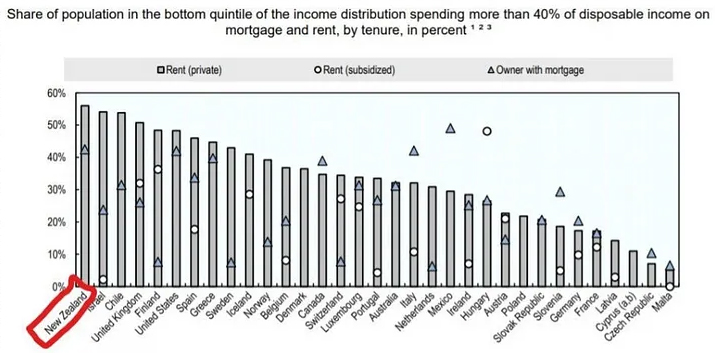
Source OECD - Affordable Housing Database, Figure HC1.2.3.
How does a city like London or Auckland provide specialist services like healthcare if the cost-of-living equation of working in a city hospital is for most young people impossible to solve?
It is my contention that the discussed failing social expectations related to unaffordable housing is a large part of the explanation for why New Zealand has a shortage of essential workers — such as the well-publicised shortage of hospital workers.
While I contend for the private sector unaffordable housing has caused a breakdown in the reward for work equation and is a contributing factor to New Zealand’s poor productivity performance (see this story for a detailed description of the link between inelastic housing supply and poor productivity).
In conclusion
Clearly fixing the problems of New Zealand’s built environment — the planning system, infrastructure supply, the housing market, and so on are not easy or quick fixes. Our English-speaking peer countries are all struggling with the same issue — so these are deep-seated problems in need of serious reform. The impact of this failing is wide reaching — 85% of New Zealanders live in urban environments so fixing or not fixing the built environment has society wide implications.
Despite the importance of housing and improving the built environment I think the new National party led government is going to struggle to make progress in this policy area. Essentially all they have done is return the policy settings back to 2017 — they haven’t articulated a new vision. Politically they won the argument that Labour failed to ‘Let’s Do This’ so there hasn’t been much backlash from removing the progress the last Labour government did make. Yet the 2017 settings when National was last in government were not working. Doing the same thing and expecting something different is stupid.
The social breakdown problems discussed above will continue to worsen unless a strategic overhaul of the built environment is implemented. If the new government doesn’t do that. Then at some point — whether it be in 2026, 2029, or 2032 — there will be an opportunity for opposition parties to successfully campaign on improving the built environment.
For Labour, my advice now that they are in opposition is to do some serious policy work. Learn from the Kiwi Build disaster — it was classic New Zealand no.8 wire thinking. A high-risk unique solution that did not survive the rigors of implementation when an off-the-shelf strategy that has been tried and tested elsewhere would have been the better and safer choice.
Left-wing progressives should relearn the lesson that has been long known to social policy people that if housing is unaffordable, it is just about impossible to make progress on any other social issue. The solution is building a lot more houses, all types of houses, as the — The Housing Crisis is the Everything Crisis — explains so well (H/T Chris Harris).
I would suggest that Labour do a “How better localism helps New Zealand” policy investigation. Something the size and scope of its two-year “Future of Work” project that it reported on in 2016. The party should have a look at localism from all directions — not just the ‘bottom-up’ housing and infrastructure paradigm that I have discussed in this piece. For instance. What would better localism mean for Māori? The Environment? Mental health? Social housing? And so on.
Labour should consider that making reforms to housing, infrastructure, and planning the built environment are consistent with their core values. That the fight for affordable cost-of-living dates back centuries and was a vital part of the fight for greater political rights. For instance, in the 1830s and 40s, British trade unions joined forces with progressives to campaign against the landed gentry to implement affordable food laws.
Finally, former Prime Minister Bill English after the election was interviewed about the different issues that the change in government has raised.
The last area which is a bit tangled and will be very challenging is around housing. If there isn’t progress on housing affordability, we will almost certainly end up with a wealth tax and a comprehensive capital gains tax because the people shut out of the market are not going to tolerate another round of house price growth where they are locked out just because of political settings around land and infrastructure. Bill English October 2023
Bill English's rationale essentially being there would be a backlash if the societal expectation — that if you work hard, you should be able to live a decent life — was lost.
The paradoxical problem with Bill English’s speculation is that the infrastructure needed to supply affordable housing will not be possible without revenue reform. The easiest way to achieve that would be some form of wealth tax so that central government has the budgetary headroom to devolve some locally generated revenue to local government entities — whether that be ACTs sharing of GST with local government, or France’s small income tax to fund regional transport providing entities (VT tax), or some other similar scheme.
In my opinion, unaffordable housing might not cause New Zealand to get a wealth tax in the way that Bill English explains. The story might be bigger. A future wealth tax might create the opportunity to properly reform local infrastructure funding which will have a clear purpose of delivering affordable housing.
52 Comments
Good piece. However what I think you miss, and Labour certainly missed, is the need for much more intervention in terms of development. Liberalising planning rules is only one part of the solution.
To be more specific - Labour gave itself the tools that are necessary, but didn’t use them. That is, the Urban Development Act.
With this tool, they could go to somewhere like New Lynn and compulsorily acquire the huge site next to the centre that is being land banked by Chinese interests. They could then proceed to develop a portion of the site for social housing, then sell other parcels of the site to community housing providers as well as private developers (with strong delivery conditions attached).
Why they didn’t do this is a mystery to me. Lack of ambition? Apathy? Believing their own BS too much that liberalising planning rules will be the silver bullet???
It was very disappointing, but not surprising.
I don't really care what type of houses NZ builds - we need more of all types - social housing, terrace housing, apartments etc.
But the same theme applies. The city/region will need to see it as part of a wider process in which they are collectively benefiting from.
So for instance, if we were to master plan a development that included more social housing do it in a way that improves the economics of a transport project that benefits the city/region.
Hence why the New Lynn location should have been a no brainer. New Lynn has had lots of investment into its train station etc. governments need to pick winners
I think properly revenue resourced city/regions will make better decisions on whether to invest in that type of pick the winner process. If it is the cities and regions own money, they will be more careful with putting it to its best use. Whereas if it is 'free money' or 'no money' from Wellington that accountability is lost.
That is not to say cities/regions will never make mistakes. But in the long-term the incentives of a bottom-up governance system will push them towards making better decisions.
You are as ideologically immutable as the current dying gasp of neoliberalism.
You note that all 'English speaking' (why describe a resource-grabbing global Elite by language? Avoidance?) nations are in the same boat. Yes, they are. They are all hitting the Limits to Growth, and suffering from entropy. Nothing whatever to do with language; a lot to do with physics. We need to voluntarily degrow - which we won't, to wit you long fierce piece - or be overtaken by involuntary degrowth.
The former is preferable.
With regards the New Lynn site - have you spoken to the owners? Where do your facts come from?
Do you know that what you suggested should be built was - in fact - cost viable?
Or did you just want to go off about the previous government?
If, with your infinite wisdom, the Labour government had done what you suggest, would you have been amongst many that blamed them when the project lost money?
Why yes. I'm sure you would have.
Very good article Mr. Harre.
Yes, we failed, however will we learn? I see no indication of a genuine willingness to do so yet.
I am not seeing much genuine willingness to learn either Squishy. Mostly I have given up trying to influence the debate. I only wrote this article because I was isolating at home with covid (fortunately without too bad symptoms). NZ is nice enough to enjoy - the outdoors, cycling etc. But it is annoying that we could be so much better if we learnt some lessons from other more successful places.
More successful in being completely unsustainable, is what they are.
You want to 'learn' from that?
Oxymoron territory.
It does concern me powerdownkiwi that you seem to savage any opinion which you appear to disagree with. Brendon has quite rationally and with backup data produced an argument which many are responding to. Their comments are respectful and helpful for a sensible discussion to evolve.
If you need to be nasty could I suggest you find another dark place to share your venom.
If you are so sure of the accuracy of your opinions maybe you should not hide behind a non-d-plume. You are promoting brave actions. Be brave yourself and tell us all who you are.
I've just discovered that my name isn't on this site. I will remedy this. My name is Garry Moore and I reside in Christchurch, NZ.
This article has a lot of good points in it, but the article avoids mentioning race, Labour's attempt at social engineering and Labour's attempt to give iwi a stranglehold over the planning process.
As long as money for local infrastructure is seen as a way for left wing politicians to enable social engineering - taking people from deprived areas infested with noise and crime and plonking smaller areas of social housing with noise and crime into the middle of quiet, prosperous suburbs then there will be resistance from people living in those areas.
If left wing poiticians had concentrated on providing social housing in the areas that need social housing and left other people the ability to get on with their lives then they probably would have made more progress. But the cry from Labour was that no one should be allowed to move forward until those who have been left behind have caught up. The lesson from history is that letting people move forward enables the whole crowd to move forward. Stopping people from moving forward means that the whole group gets stuck.
Bill English is right - do the local infrastructure funding now or a wealth tax will come. Now is the time to arrange the funding without the spectre of left wing social engineering. Saying that a wealth tax should be brought in first as the author has suggested just means that the money from this tax would be diverted to rent seeking interest groups. A new taxpayer trough for interest groups and bureaucrats to get their snouts into.
Labour had the means to do the above light rail network that was the original plan but they changed it to an unworkable town to airport link and lots of expensive tunneling. Why? Probably to enable social engineering along the route of the proposed link.
The middle class of this country cannot get their heads around the idea that future-proofing the prosperity and social cohesion of New Zealand requires central govt to support local govt with infrastructure.
The middle classes must allow the lower classes to get on with their lives as well or wealth taxes and social engineering will follow.
We need less greed and more co-operation in our society. We need to stop enabling people to make money by getting in the way of those who are trying to make a difference.
Fair call re the social engineering point.
I think this issue is about how we conceive of sovereignty. If NZ insists on having a top-down governance system, then race based politics becomes a zero-sum game. Wherever Māori co-governance is imposed then by definition that is a loss of democratic accountability to people who do not have that racial background. Either a co-governance Māori entity controls water, health, planning etc or they don't.
Yet if NZ implements a more bottom-up governance system using the subsidiarity concept to sovereignty then Iwi and other smaller units of society (like regions/cities as discussed in my main article) can be given as much responsibility over certain areas as they can manage. They can run certain public services - a kindergarten, a school, a type of health care service, a community housing provider etc and regions/cities can be responsible for water, transport etc. Sovereign NZ citizens can then have a choice of which of these public services they use. This bottom-up system of sovereignty or governance is not a zero-sum game. The total becomes greater than the sum of parts.
Great that you do the feedback comments Brendon. It's like marketing follow-up!
My vote is that Maori do not control water, planning or health. I might say I don't care if they control their own water within their own rohe, but then they will say everything within our tribal area including everybody else's water is ours to control. When it comes down to it they are monopolists.
Being a transport guru, why do you think the original light rail/tram network idea was abandoned for a single rail corridor from the central city to the airport? It made no logical sense to me unless it was social engineering or real estate redevelopment along the rail corridor. I'm just presuming that vested interests hijacked the original idea for their own ends. I personally think that a light light rail/tram network is a really good idea for inner Auckland.
I don't know why they chose to move away from the original surface level light rail to the airport concept - I can't read the minds of the Ministers concerned or the wider Cabinet who signed off on the tunneled light rail project. I think by time Labour announced they were extending tunneled light rail through the North Shore despite not having built a metre of light rail to the airport that they were in crazy insane jumped the shark territory - especially as the whole thing was going to cost something like $45bn.
And I do wonder now, after the fact, if Auckland Transport had the French targeted transport tax whether they would have built the airport light rail scheme by now (the original proposal was theirs). I think it would be at least partially finished (maybe to Mt Roskill) and that other parts of NZ would be planning congestion busting rapid transit schemes that would be soon opening up huge areas for new housing.
I think that once the CRL is completed , every suburb will be wanting a rail (light or heavy ) line .
A good & comprehensive analysis with several very pertinent factors that are rarely considered by media commentators. I agree with much of it.
However, if a wealth tax is the answer you're really asking the wrong question.
A wealth tax by itself will not solve the housing crisis. But fixing regional and city infrastructure financing is a necessary part of the solution. A wealth tax might help achieve this by creating the budgetary headroom for central government to be able transfer some revenue sources to local or regional government. Such as what ACT proposal re construction related GST or Frances VT income tax for city/regional transport entities.
A wealth tax depends on valuations of assets. Ask yourself who exactly provides the valuations, who exactly collates and records them from year to year and most importantly in terms of the privacy of the individual we have all accepted up until now as sacrosanct, who exactly audits all of that. Just to speculate, on the Greens policy alone for example, if a financially humble family should strike it lucky with a say $4mill lotto win do they realise IRD will every year want to know where that wealth is, those assets, what has been bought, what has been sold, please provide the information and we have the right to enter your property to check it all out. Wake up New Zealand whatever a government might think to collect by a wealth tax is a thin veneer in terms of the loss of civil liberty that would accompany it.
Can’t they already do a lot of this already if they suspect AML or tax evasion? Otherwise sounds a lot like nothing to hide nothing to fear to me.
The Magna Carta in 1215 has been a cornerstone of our law. It was created precisely to prevent the Crown from intervening in the legitimately owned assets of citizens as had been the case previously per the Domesday book of 1086 for example. The IRD certainly can investigate tax evasion on income, and the Ministry of Justice money laundering, and if any assets are thus associated. Similar to the court being able to seize assets found to have been gained by the proceeds of crime. But having the Crown collating, monitoring, auditing a dossier on the personal property of their law abiding citizens has not been a welcome feature, at least in the free world that is.
Brendon,
Interesting article. I have done some work on capital taxation-i used to deal with CGT and Inheritance tax in the UK-and I doubt if a wealth tax is the best way of tackling the issues. In fact, the OECD countries with one has fallen significantly. In terms of actual money raising, I would favour a direct property tax like stamp duty. Looking at figures from the UK, i think that would raise more revenue, be simple to administer and difficult to avoid. A tax on empty properties could also be considered, but that is more problematical.
This is all 'snapshot in time' thinking. Even to apply simple maths rather than exponential functions to population estimates over my current 60yrs to the coming 60yrs would indicate that shoehorning the additional bodies into the existing legacy colonial towns and cities is likely to be messy.
Build new cities and towns, compact, efficient, disaster resistant thoughtfully located and well connected. Let those who choose to age in place do so bearing the full cost of the upkeep of their leafy suburbs.
NZ unfortunately doesn't do long term planning and we lack the imagination to consider how to make our built environments better.
Two things have happened, NZ has largely missed the tech/AI revolution and central banks are debasing currency's. We are largely doing the "same old stuff" - some primary, some construction, some finance (90% offshore owned). We really aren't adding much value, yet we believe we are entitled to first world accomodation and standard of living.
I agree Te Kooti. There is not much entrepreneurial thinking in New Zealand - both in the private and the public sectors.
I think that's a little unfair. We have many very entrepreneurial people/companies. A few mange through very hard graft to make their ideas a saleable, viable product. When they do so more often than not an overseas entity swoops in and offers a price to good to turn down and the idea/product/business disappears from little old NZ. Mostly this happens because it is so incredibly difficult to find funding for new ideas to reach a stage where they can make money. And if they do the originators are exhausted and want out!
So much here to agree with Brendon.
I have been struck in recent years about the inability of the civil service to get anything done. It's process over outcome. So entrenched I don't think they can even could contemplate it as a problem.
And our cabinet ministers come from the same demographic, so no clue about the problem either.
Meanwhile Wellington continues to grow.
Factoid. England fought the Napoleonic wars. The Home office of the time had a staff of twelve.
‘Process over Outcome’ - nailed it.
So much huge wastage under Labour, with a bloated and unfocussed Kainga Ora. Such a huge missed opportunity. Sad.
KH has fed you nonsense. You swallowed it? Hook, line and sinker? (See my explainer further down.)
I love it KH. Process over outcomes really does describe the problem.with Wellington.
Elite overproduction - Wikipedia
Are we overproducing elites and instability? - Niskanen Center
Edit:
"In truth, the elites are terrified of populism because they are terrified of democracy. "
Good links. Thanks
With respect, KH, you have completely missed the point of why the civil service exist.
The civil service (both central and local government) exists to implement the laws passed by NZ's politicians. If it is overly large, bureaucratic, and unwieldy, then it is because we - the voters - have elected politicians that have made it that way.
You may answer by saying that is the fault of the left. But you'd be completely wrong. The 'civil service' has grown under each government for years as more and more laws, departments, and checks and balances, have been implemented.
If you doubt me, then I suggest you look closely at the enormous legal, planning and consulting industry, not to mention mountains of red tape, that has been built up around the RMA.
No government, left or right, has done anything much stop it.
The RMA arrived on the books in 1991. That's 33 years ago.
Edit: I guess the point I'm trying to convey is that "perfection is the enemy of progress".
We elect politicians (or at least the 5-10% of swing voters do) looking for them to implement 'perfection'. They never do.
They just make the whole situation far, far more complex than it needs to be.
Governments should NEVER feel the need to implement some of the silly ideas they go to the polls with. (They shouldn't ever go to the polls with them either - but they do as there are no laws to stop them!)
(Kiwis aren't that bright. Or at least the 5-10% of Kiwi swing voters aren't!)
KH,
. "England fought the Napoleonic wars". Nit-picking perhaps, but it was a British endeavor and the victory march in Paris was led by Highland regiments, less than 100 years after Culloden and the Disarming Act of 1747.
Good piece.
Infrastructure funding is critical and localism (subsidiarity as espoused in recent piece by Brian Easton) plays a role as well.
The one thing I think missing is a population strategy...although you mention exponential function and migration churn there is no sense of limit (or location for that matter).
Sadly I doubt Labour (or any political party) will adopt such a comprehensive restructuring.
Fair points Frank.
I don't think National has a comprehensive strategic plan either.
So we are not been given positive choices...
National has not presented a comprehensive strategic plan, nor is any evident. Their mega-mini-mini budget is a classic example of there being no strategic plan.
The NACTF coalition got voted in because 'they weren't Labour' and promised to tear down everything the previous government had done over the last six years. Going backwards is not a strategic plan. Nor is it what voters voted for in the two previous elections.
Given NZ society is adversarial rather then collaborative, and our lack of governmental and technocratic talent, what hope do we have of developing consensual, durable and well designed solutions?
So much of the thinking looks binary - either/or - and there's little nuance to thinking.
Take public transport: the debate centres around road or rail solutions while other ideas get sidelined -
Like connecting up all our fragmented public transport services - where I live in Dunedin, the city council creates the bus stops but the service itself is run by the regional council, and the two seem to be incapable of effective collaboration.
Like different transport modes: we have a lot of waterways near many of our cities, but ferry services of any description are rare because water access is a regulatory nightmare, and modes like overhead cable cars that are very successfully used in other places - that don't require a continuous ground network and cope well with difficult terrain like ours - are ignored.
Like allowing medium density green- or brown-field developments on the city edge if they are well-served by transport and infrastruture. But planning still specifies that kind of development as low density: our rigid land use rules are the enemy of creative development.
Typical analogy always pic the eyes out of a country that are doing well at one thing to then compare NZ too. If you like France how about we become like them with nuclear energy since they have the highest propotion of nuclear generated energy to population. Plus their energy is cheaper. There is also fundamental flaws in your comparisons First how do these non English speaking countries compare on indigenous rights. Would their native people stop a major highway progressing because you might upset a Taniwha holding up the project for approx 5 yrs. Secondly do these non Englisj speaking countries stop a road getting built because of one set of nesting endangered pipers like what happened on the north shore. Thirdly how do these non English speaking countries go with Health and Safety and if a death occurs on site look at Qatar re building the Stadium for the FIFA world cup and a overseas worker dies. The leader of the Qatar football Association shruggs his shoulders oh well that happens. And I can go on with alot more instances. By all means I would say build it and let's forget all the above who gives a sh.t but the PMC will be the first to whinge about it
Great article Brendon. And thank you interest.co for publishing it. Lots to consider for sure, but a fundamental shift in how we do things [pdk would say about how we think about doing things] is paramount for anything really good to happen here. One of the issues is that we have such a divided society today that it doesn't matter what one group suggests [regardless or not of the merits] the other group will set about creating a lot of noise, mostly in opposition to the suggestions, that the possibility of any progress gets lost in a shouting match, which is where we've been held up [?] now for the best part of the last 40 years.
Perhaps we should employ a third party with some relevant experience in the above topics to come & advise us on the possibilities open to us, based on our current situation, demographics, size, economic position etc.
The point made above about our race-based divisions is 'still' the elephant in the room, however.
This has the ability to destroy what is left of New Zealand as a so-called first-world member, which I sometimes wonder if it is their intent in the first place. However, without co-operation & some goodwill from all parties involved, NZ is losing the battle. I am currently not sure we are capable of remedying this, & other issues, ourselves. We [the NZ govt] has done more to try & right the wrongs of the past than any other govt I know of, in today's world of 200 plus countries, over the past 50 years, but gets no credit for that process, even though that very same process has been progressed massively [by state, bureaucracy, legal etc.] from a single page document to literally hundreds of thousands of pages of new law since it began in 1975.
Almost 50 years into this reconciliation process, the aggrieved are even more aggrieved today than when we started the process in 1975. This is a very sad situation indeed. Until such time as we all sit down & try to discuss this issue with some objective measure, for the benefit of us all, then getting anything done that will be of any real value to anyone in NZ is off the agenda. Once again, sadly. The new coalition govt could & probably should front this issue face first, as until we can somehow agree on what the future might look like together [God help us] then all we are doing is bailing out a sinking ship, or more correctly in our case, a couple of over-sized aluminium fishing boats, at the bottom end of the South Pacific.
Thanks, Wrong John. I agree that NZ needs to be more unified and less divided. I was hoping that the type of governance structure I was advocating for would lead to more cooperation and goodwill.
NZ would be more unified and less divided if we collectively recognized the Dunning-Kruger effect every time it surfaces.
Thanks Brendon. Great read.
In reading where other countries are doing it better it occurred to me that perhaps that's why their productivity is so much better than NZ's.
In a nutshell, when other countries invest in creating something new, it costs far less than NZ because NZ Inc has built so many fiefdoms to catch the occasional (often exceptional) stuff-up that it has now become massively difficult to do anything because every fiefdom effectively has either veto powers or the right-to-block until they are satisfied.
And it gets worse. Almost all veto powers and/or blocking powers get escalated to central government ministers and/or courts where theatre and grandstanding is the name of game rather than black-and-white cost/benefit analysis.
And worse? The black-and-white cost/benefit analysis gets ignored or deprecated because somehow completely unqualified elected representatives - and their likewise unqualified 'offices' - get a far greater say than their incompetence should ever merit.
But what's worse is that equally unqualified nobodies among the chattering class get their foolish views amplified to the extent they get quoted as 'public opinion'. (Classic case in point? Aucklander by a significant majority want higher density. You'd never know that unless you actually read AC surveys on the matter. And even AC staff are unaware of these results!)
Have we become a nation of individualists who believe we have rights over what our near, and distant, neighbors are allowed to do? I.e. pearl clutching busybodies who'd rather interfere in other's endeavors than actually do anything ourselves? Have Kiwis become that silly? Sure looks like it.
Kiwis are their own worst enemy? Yeah. Probably.
Good comments ChrisOfNoFame. You describe the problems, of the Vetocracy, Nimbyism, and central government Ad hoc decision making re infrastructure provision well.
Usual resource blind and pro human cramming nonsense!
"The Anglosphere needs to learn to love apartment living. Housebuilding rates in English-speaking states have fallen behind the rest of the developed world"
Why exactly do we need to get used to living in a shoe box? Is this the brave new world we are so exited to march towards? Sardine living?
While the accompanying graph includes only Italy as a named "non English speaking country", it's population is declining. Is there a clue there! Spain, France, Germany, population barely moved. Japan, South Korea. Decline, stable. Belgium, Netherlands, Switzerland? Slow growth. Nordic Countries, Slow growth.
The Anglosphere? Third world rates of population growth!
Sh!t flowing down streets? Can't swim anywhere when it's hot? Water undrinkable? The biosphere in a state of collapse and the answer is more people, more industrialisation, more, more, building, infrastructure, consumption, waste. This is a disaster.
This sort of siloed thinking is a disaster for the quality of life in NZ! Wake up!
Why don't you critique this reference in my main paper instead of taking the others out of context.
"The solution is building a lot more houses, all types of houses, as the — The Housing Crisis is the Everything Crisis — explains so well (H/T Chris Harris)."
Can't believe you sent me to that video as some sort of rebuttal? The housing crisis is the everything crisis? Ridiculously high population growth is what caused the housing crisis! The crisis wasn't caused by not allowing endless sprawl by protecting food production and areas supplying natural services instead of "freeing up more land".
Coupled with printing truck loads of cheap cash after the GFC, population growth was always going to blow an enormous bubble. Human civilization was in serious overshoot in 2008, but instead of dealing with a deteriorating biosphere, we doubled down on growth and consumption. People's savings being trashed by holding interest rates artificially low, while inflation was eating their cash. Of course property is a store of value, especially when government policies focus on third world population growth.
You can stack plastic shoe boxes one on top of the other until they block the sun out, but unless the prisoners in those shoeboxes never eat, use energy, or leave, no other crises are solved! Population growth driven demand.
So high property prices keep you poor? Well yes, but how does freeing up people's earnings solve the climate crisis, as they jet around the planet and cram their homes with consumer goods? Good for extractors and waste management I guess? Not so good if you live next to the mine, the plastic waste incinerator, or the beach with toilet paper marking the high tide mark!
I note in your Youtube reference a little section applying specifically to NZ. A study spun as evidence of population growth not resulting in unaffordable housing?
https://scholar.google.co.nz/scholar?q=past+research+on+the+impact+of+i…
The study seems to say the opposite. It looks at why house prices are rising, and the main conclusions are population growth and low interest rates. Expectation of captal gain follows ONCE these initial factors cause momentum!
Palmtree,
Slow population growth in Japan? I think you might want to do some research. Your comments about shoebox living betrays your ignorance, but reveals your prejudices.
Actually I said Japan's population is in decline. I'm not sure how that shows my ignorance and prejudices, it's just raw data. Wish them well on their journey to living within their sustainable resource base. Maybe around the 5 million mark?
I can't remember any government in NZ spending so much on failed projects and boondoggles as the last one.

We welcome your comments below. If you are not already registered, please register to comment
Remember we welcome robust, respectful and insightful debate. We don't welcome abusive or defamatory comments and will de-register those repeatedly making such comments. Our current comment policy is here.